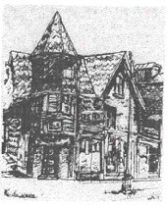INSIDE THIS ISSUE:
Shutta Crum
Paul B. Roth
Laszlo Slomovits
Duane Locke
Felino Soriano
Chris Lord
Jerry Blanton
Carmen Firan
Amelia Makinano
Connie Stadler
Fred Wolven
Duane Locke
Tolu Ogunlesi
Running Cub
Joanie Freeman
Gerald Clark
Karyn M. Wolven
Holly Day
Dike Okoro
Fred Wolven


Strange to be among the sentiments of obscured May,
The senses were prattle, no prestructures.
The horror of decoy ducks darkened the pond, but
The splashing sounds of egret's water-scissoring feet
Were the tower, the decoy's antidote, and brought
A memory of golden rust specks on blunted point
Of a lost bent nail found under the rainbow
Fins of minnows by a wood knee in a cypress swamp.
I thought of a Degas ballet dancer lifting a white
Stocking leg to put on floodlight-struck pink silk slipper.
I recalled freight cars filled with aluminum scraps
That sent into the atmosphere silver somersaults.
I thought of the us that could be, we stood
By the browned waters of the Blue Danube,
And smiled as we spoke in unison,
"Yes the blue waters are brown."
A HERMIT
I was trying to imagine how
19th century, pseudo-medieval
William Morris would look like
If sketched or cut out be
A maroon silhouette.
Or if done in pink or mauve,
Or what he would say
If on Tuesday afternoon at
A salon of Mallarme. Would
Wilde say, "I wish I had said that."
But my desultory improvisation,
Jazz ruminations, was disconcerted,
By a knock, the knock, a Bo Diddley
Rhythm derived from Stravinsky,
A knock on my door's quarantine sign.
My quarantine sign, made of tin,
So I heard the tintinnabulations, at
First, muted by a raven-colored glove
Worn over the knocker's fist, but then loud
Like Boris Godonov's Russians bells.
The sound now sounded as if
Made by a brass-knuckle fist
Of an ordinary character out of
A violent, brutal twenty-first century novel,
A best seller among the autistic I-pod set.
I did not answer or call 911,
But donned my 12th century
Crusader armor with the red cross
On front, and the autograph
Of Peter the Hermit, his mark.
The noise outside, even the fireworks
Ceased. I learned it was some pious group
Out to do good deeds for the elderly.
They had changed my handmade,
Shabby, much bent quarantine sign
Of tin to one more au courant and fine.
"Quarantine" now flashed in bright red neon;
The flashing letters were bordered
With pink, naked, dancing chorus girls
Copied from a desert vision of St. Anthony.
CABARETS (CAMBERETS).
CHURCHES (CAMBERETS)
It in retrospect seemed kinetic
And a case study,
My imaginary lean
On an imaginary lamppost,
Art decor influenced,
In front of Tiffany and Company,
But at this tonsured time it was maya,
The Tiffany big-brass buttoned door man
Was really a crusader,
A feudal knight, a village pillager
Turned cross-tourist and international.
A cripple watched the sloshing bubbles
Of the cocktail carried by the celebrity;
Its cut-glass colored liquid out sparkled
The atonal row of diamonds
On her wedding, her third, a trinity, finger.
Aeolus puffed, her white dress swirled
Above her knees and the scene
Became immoral and an icon of the new asceticism.
"There are more churches than cabarets
In Renaissance Harlem," thus spake the Duke
As he rode in a buggy to circle Central Park,
Listening and learning how to reverse a figure.
I, a composer, would sneak into the zoo,
Watch the washed concrete
Of the Hunger Artist's cage,
When fondled by sunlight, glow
With a Coptic script and musical notes.
I would wonder where to go
With its gift of a diminished seventh
That appeared on the manuscript
Of its hard floor.
"WE MUST LEARN TO SEE IT,"
MAURICE MERLEAU-PONTY
Once when walking inland,
Some miles
From Venice,
I saw it,
It was spread out across a sidewalk,
I looked for a stream of water,
But there was no stream of water,
Only a
Sidewalk.
I mistook it as a net to catch eels,
For I had seen many eel-catching nets
Spread over streams near Venice.
It was similar.
Up close, I examined it. It seems
Ferocious.
But its ferocity was being covered by a short man
With quotations
Found on cave walls. The quotations
Were in a
Runic
Language.
There were some arrows stuck in the side
Of a rune.
The short man informed me that it was not
A net
To catch eels, but it was to catch brides.
The short man could read the runes,
He translated a few words, "assassination,"
"murder," "enslavement."
Then the short man explained,
No one ever reads what the runes really say,
But reads what they want the runes to say.
No one understands what the runes are saying,
If the brides
Could read what the runes were saying,
The brides
Would run away.
The brides pretend they can read and
Understand the runes,
But the brides cannot either read or understand.
The short man started laughing,
Yes, if the brides could read the runes
They would run away.
He laughed and laughed.
Duane Locke, Lakeland, Florida